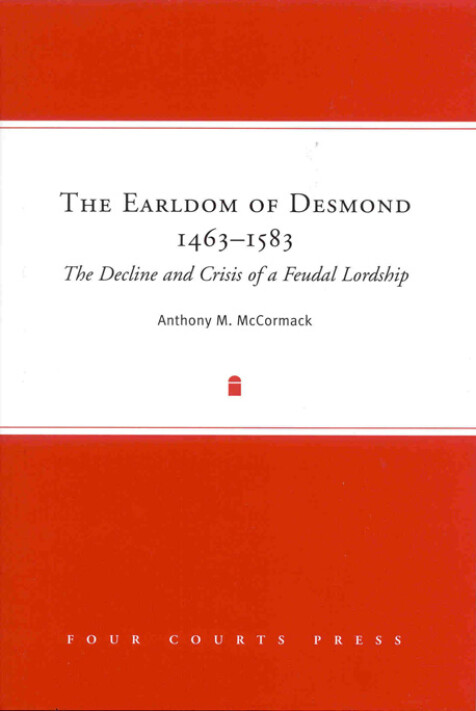The Earldom of Desmond, 1463–1583
The decline and crisis of a feudal lordship
Anthony M. McCormack
‘Anthony McCormack is among the most gifted of Irish historians to emerge in recent years, and his publisher is to be commended for recognising the potential, largely realised, in this fine study of the earldom of Desmond from 1463 to 1583, a period that dispenses with traditional historiographical scaffolding … McCormack presents a most accomplished narrative of the political history of the earldom of Desmond in the early modern period, based largely on archival research of impeccable quality’, Seán Duffy, History Ireland.
‘This an exemplary investigation of an important dynasty. Written with clarity and directness, it may not overturn any of the orthodoxies current in the interpretation of late medieval and sixteenth-century Ireland. However, it does introduce numerous fresh emphases, notably in its discussions of the two rebellions of Elizabeth’s reign and the Fitzgeralds’ involvement in the politics of Catholic Europe as well as of Tudor England. In sum, then, it is to be welcomed as a substantial addition to knowledge and understanding of sixteenth-century Ireland’, Toby Barnard, Irish Studies Review.
'A solid and engaging history of the Desmond lineage in early modern Ireland and a useful entry point for those interested in further exploring the difficulties encountered by such Old English families attempting to adapt to a new political landscape’, Brendan Scott, Sixteenth Century Journal.
‘[This] book is both scholarly and readable, and the complexities of Irish history, unfamiliar to many in England, are generally presented with clarity', John Ashdown-Hill, The Ricardian.
‘McCormack’s account of the earldom’s sophisticated administrative structure in the early 1500s is a significant contribution to a growing body of work that challenges the notion that Irish élite politics was merely might-makes-right warlordism … Provocative rereading of contemporary power relations in this era of direct rule from London … McCormack paints a compelling picture in which co-operation between crown and native élites may have been possible … an excellent study,’ Brendan Kane, Field Day Review.
‘Through a broadly chronological analysis, beginning with the arrival in Ireland of the Fitzgeralds in the twelfth century and ending with the execution in 1582 of Gerald Fitzgerald, the penultimate Desmond earl, McCormack’s study seeks “to rescue the Desmonds from their comparative obscurity” and to show that their earldom, far from being a “feudal anachronism in an age of encroaching Tudor government” was perfectly capable of adapting to the changes brought on by rapidly centralising English state … [T]his is a solid piece of work that does much to improve our understanding of the Tudor conquest of Ireland by throwing new light on the earldom of Desmond’, Christopher Maginn, Studia Hibernica (October 2008).

